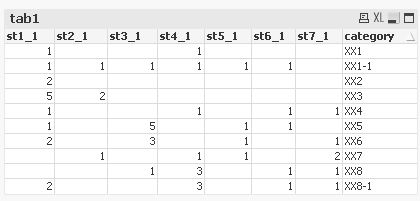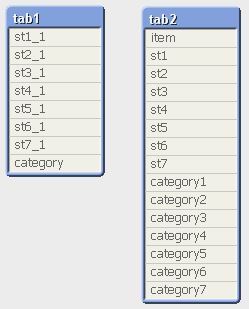Unlock a world of possibilities! Login now and discover the exclusive benefits awaiting you.
- Qlik Community
- :
- All Forums
- :
- QlikView App Dev
- :
- Re: how to join two table by a fuzzy condition
- Subscribe to RSS Feed
- Mark Topic as New
- Mark Topic as Read
- Float this Topic for Current User
- Bookmark
- Subscribe
- Mute
- Printer Friendly Page
- Mark as New
- Bookmark
- Subscribe
- Mute
- Subscribe to RSS Feed
- Permalink
- Report Inappropriate Content
how to join two table by a fuzzy condition
I want to join [tab1] and [tab2] to get result as [out]
but in [tab1], not every x1 is decided by combination of field a and field d, it can be field a and field c or others.
Pls help, thanks a lot
- « Previous Replies
-
- 1
- 2
- Next Replies »
Accepted Solutions
- Mark as New
- Bookmark
- Subscribe
- Mute
- Subscribe to RSS Feed
- Permalink
- Report Inappropriate Content
if i understand your question
RESULT

SCRIPT
for testing I add a flag to filter your requirement
you can easily modify the script to keep only the records you need (FlagMatch=1) and/or to put catgory in columns instead of rows
tab1:
load
if(len(trim(s1))=0,'?',s1) & if(len(trim(s2))=0,'?',s2) & if(len(trim(s3))=0,'?',s3) & if(len(trim(s4))=0,'?',s4)
& if(len(trim(s5))=0,'?',s5) & if(len(trim(s6))=0,'?',s6) & if(len(trim(s7))=0,'?',s7) as F,
*
;
load * inline [
s1,s2,s3,s4,s5,s6,s7,category
1,,,1,,,,xx1
1,1,1,1,1,,,xx1-1
2,,,,,,,xx2
5,2,,,,,,xx3
];
tab2:
load
if(len(trim(st1))=0,'-',st1) & if(len(trim(st2))=0,'-',st2) & if(len(trim(st3))=0,'-',st3) & if(len(trim(st4))=0,'-',st4)
& if(len(trim(st5))=0,'-',st5) & if(len(trim(st6))=0,'-',st6) & if(len(trim(st7))=0,'-',st7) as F1,
*;
load * inline [
item, st1,st2,st3,st4,st5,st6,st7
item1,1,1,1,1,1,1,2
item2, 2,,,3,1,,,
];
T:
noconcatenate
load * resident tab1;
join load * Resident tab2;
DROP Table tab1, tab2;
Table:
NoConcatenate
load
rowno() as id,
*,
if(WildMatch(F1, F),1,0) as FlagMatch
Resident T
;
DROP Table T;
- Mark as New
- Bookmark
- Subscribe
- Mute
- Subscribe to RSS Feed
- Permalink
- Report Inappropriate Content
Can you describe a bit more in detail please.
maybe a longer example table would help
- Mark as New
- Bookmark
- Subscribe
- Mute
- Subscribe to RSS Feed
- Permalink
- Report Inappropriate Content
hi, Marco
thank you for your reply.
I made some example tables with more records such as below.
I want the output can get item, st1~st7 in tab2 and category in tab1.
for example, item1, because st1=1 and st4=1, I can get category1=XX1 according to 1st record in tab1.
and then because st1=1 and st2=1 and st3=1 and st4=1 and st5=1 and st6=1, I can get category2=XX1-1 according to 2nd record in tab2
I don't know how to join tab1.qvd and tab2.qvd to get what i want.
- Mark as New
- Bookmark
- Subscribe
- Mute
- Subscribe to RSS Feed
- Permalink
- Report Inappropriate Content
if i understand your question
RESULT

SCRIPT
for testing I add a flag to filter your requirement
you can easily modify the script to keep only the records you need (FlagMatch=1) and/or to put catgory in columns instead of rows
tab1:
load
if(len(trim(s1))=0,'?',s1) & if(len(trim(s2))=0,'?',s2) & if(len(trim(s3))=0,'?',s3) & if(len(trim(s4))=0,'?',s4)
& if(len(trim(s5))=0,'?',s5) & if(len(trim(s6))=0,'?',s6) & if(len(trim(s7))=0,'?',s7) as F,
*
;
load * inline [
s1,s2,s3,s4,s5,s6,s7,category
1,,,1,,,,xx1
1,1,1,1,1,,,xx1-1
2,,,,,,,xx2
5,2,,,,,,xx3
];
tab2:
load
if(len(trim(st1))=0,'-',st1) & if(len(trim(st2))=0,'-',st2) & if(len(trim(st3))=0,'-',st3) & if(len(trim(st4))=0,'-',st4)
& if(len(trim(st5))=0,'-',st5) & if(len(trim(st6))=0,'-',st6) & if(len(trim(st7))=0,'-',st7) as F1,
*;
load * inline [
item, st1,st2,st3,st4,st5,st6,st7
item1,1,1,1,1,1,1,2
item2, 2,,,3,1,,,
];
T:
noconcatenate
load * resident tab1;
join load * Resident tab2;
DROP Table tab1, tab2;
Table:
NoConcatenate
load
rowno() as id,
*,
if(WildMatch(F1, F),1,0) as FlagMatch
Resident T
;
DROP Table T;
- Mark as New
- Bookmark
- Subscribe
- Mute
- Subscribe to RSS Feed
- Permalink
- Report Inappropriate Content
source tables for script tests:
tab1:
| st1_1 | st2_1 | st3_1 | st4_1 | st5_1 | st6_1 | st7_1 | category |
|---|---|---|---|---|---|---|---|
| 1 | 1 | XX1 | |||||
| 1 | 1 | 1 | 1 | 1 | 1 | XX1-1 | |
| 2 | XX2 | ||||||
| 5 | 2 | XX3 | |||||
| 1 | 1 | 1 | 1 | XX4 | |||
| 1 | 5 | 1 | 1 | XX5 | |||
| 2 | 3 | 1 | 1 | XX6 | |||
| 1 | 1 | 1 | 2 | XX7 | |||
| 1 | 3 | 1 | 1 | XX8 | |||
| 2 | 3 | 1 | 1 | XX8-1 |
tab2:
| item | st1 | st2 | st3 | st4 | st5 | st6 | st7 |
|---|---|---|---|---|---|---|---|
| item1 | 1 | 1 | 1 | 1 | 1 | 1 | 2 |
| item2 | 2 | 3 | 1 | ||||
| item3 | 1 | 1 | 1 | 1 | |||
| item4 | 1 | 1 | 1 | ||||
| item5 | 1 | 1 | 1 | 1 | |||
| item6 | 1 | 1 | 1 | ||||
| item7 | 2 | 1 | 1 | 1 | |||
| item8 | 1 | 3 | 1 |
- Mark as New
- Bookmark
- Subscribe
- Mute
- Subscribe to RSS Feed
- Permalink
- Report Inappropriate Content
Hi Wei,
here is my solution for this interesting task:
I extended your tables a bit (see above):



SET CustomMatch = if(len($1) > 0 AND len($2) > 0, $1=$2, -1);
tab1:
LOAD * FROM [http://community.qlik.com/thread/112457]
(html, codepage is 1252, embedded labels, table is @1);
tab2:
LOAD * FROM [http://community.qlik.com/thread/112457]
(html, codepage is 1252, embedded labels, table is @2);
NoConcatenate
tabTemp:
LOAD Distinct * Resident tab1;
Join
LOAD Distinct * Resident tab2;
NoConcatenate
tabMatches:
LOAD * Resident tabTemp
Where
$(CustomMatch(st1_1, st1)) AND
$(CustomMatch(st2_1, st2)) AND
$(CustomMatch(st3_1, st3)) AND
$(CustomMatch(st4_1, st4)) AND
$(CustomMatch(st5_1, st5)) AND
$(CustomMatch(st6_1, st6)) AND
$(CustomMatch(st7_1, st7));
DROP Table tabTemp;
Left Join (tab2)
LOAD Distinct
st1, st2, st3, st4, st5, st6, st7, category
Resident tabMatches;
DROP Table tabMatches;
tab2Temp:
LOAD
*,
'category' & CatNum AS CatNumName;
LOAD
item, st1, st2, st3, st4, st5, st6, st7, category,
If(Previous(item)=item, Peek(CatNum) + 1, 1) AS CatNum
RESIDENT tab2
ORDER BY item, category;
DROP Field CatNum;
DROP Table tab2;
tabTemp3:
Generic LOAD
item, st1, st2, st3, st4, st5, st6, st7,
CatNumName,
category
RESIDENT tab2Temp;
tab2:
LOAD Distinct
item, st1, st2, st3, st4, st5, st6, st7
Resident tab2Temp
ORDER BY item;
DROP Table tab2Temp;
FOR i = 0 to NoOfTables()
TableList:
LOAD TableName($(i)) as Tablename AUTOGENERATE 1
WHERE WildMatch(TableName($(i)), 'tabTemp3.*');
NEXT i
FOR i = 1 to FieldValueCount('Tablename')
LET vTable = FieldValue('Tablename', $(i));
LEFT JOIN (tab2) LOAD * RESIDENT $(vTable);
DROP TABLE $(vTable);
NEXT i
DROP TABLE TableList;
This script uses a generic load to create the categoryx fields and a technique described by Rob Wunderlich to combine the generated tables into one: (Qlikview Notes: Use cases for Generic Load)
I also used some custom matching macro on each field to ensure that field values with different lengths will be treated properly.
Hope you have as much fun testing this solution, as I had writing it.
regards
Marco
- Mark as New
- Bookmark
- Subscribe
- Mute
- Subscribe to RSS Feed
- Permalink
- Report Inappropriate Content
Hi, Marco
At the very first of your script, you create a function:
SET CustomMatch = if(len($1) > 0 AND len($2) > 0, $1=$2, -1);
I'm sorry that I'm a totally green hand, that I'm not very sure my understanding about this function.
Could you please teach me what's this function doing in the where condition as below?
- tabMatches:
- LOAD * Resident tabTemp
- Where
- $(CustomMatch(st1_1, st1)) AND
- $(CustomMatch(st2_1, st2)) AND
- $(CustomMatch(st3_1, st3)) AND
- $(CustomMatch(st4_1, st4)) AND
- $(CustomMatch(st5_1, st5)) AND
- $(CustomMatch(st6_1, st6)) AND
- $(CustomMatch(st7_1, st7));
Thank you very much!
Wei
- Mark as New
- Bookmark
- Subscribe
- Mute
- Subscribe to RSS Feed
- Permalink
- Report Inappropriate Content
Thank you very much
This script works.
But could you tell me what's function 'WildMatch' means?
And I have a little worry about that the number of records in result table will be very large if there are many records in tab1 and tab2, it may make the performance bad.
Wei
- Mark as New
- Bookmark
- Subscribe
- Mute
- Subscribe to RSS Feed
- Permalink
- Report Inappropriate Content
It's a logical expression that is true, when both arguments are equal or a least one is empty.
So
- Where
- $(CustomMatch(st1_1, st1)) AND
- $(CustomMatch(st2_1, st2)) AND
- $(CustomMatch(st3_1, st3)) AND
- $(CustomMatch(st4_1, st4)) AND
- $(CustomMatch(st5_1, st5)) AND
- $(CustomMatch(st6_1, st6)) AND
- $(CustomMatch(st7_1, st7));
is true when all fields are equal to their corresponding fields where defined.
regards
Marco
- Mark as New
- Bookmark
- Subscribe
- Mute
- Subscribe to RSS Feed
- Permalink
- Report Inappropriate Content
- wildmatch, from online help
wildmatch( str, expr1 [ , expr2,...exprN ] )
The wildmatch function performs a case insensitive comparison and permits the use of wildcard characters ( * and ?) in the comparison strings.
Example:
wildmatch( M, 'ja*','fe?','mar')
returns 1 if M = January
returns 2 if M = fex
in your case I used it to match st of tab1 with st of tab2
- performance
the table T is the cartesian product; it could be large, depends on records of tab1 and tab2; you have to try with your real tables and real hardware and let we know if you have some space or performance problem
- « Previous Replies
-
- 1
- 2
- Next Replies »